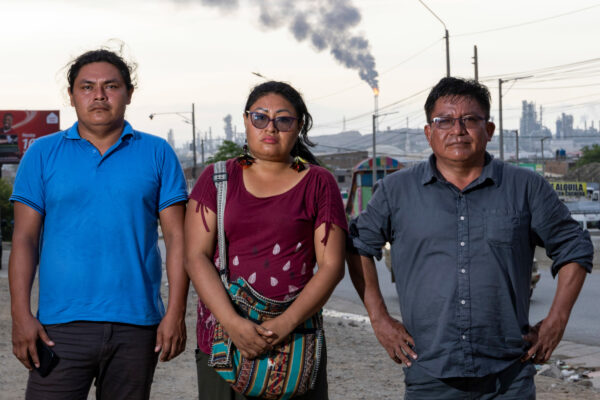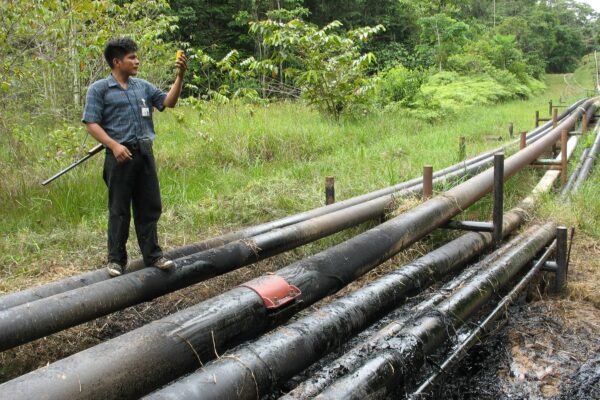To investors, ConocoPhillips’ acquisition of Burlington Resources cemented its standing among the world’s largest oil companies.
For the people living in the remote interior of Peru, the move made it just the latest trespasser in their backyard.
Leaders from the Peruvian indigenous community visited Houston last week to tell company officials face to face they weren’t welcome in the heavily forested regions they call home.
Citing decades of turmoil and environmental damage caused by other companies, the Peruvians encouraged the company to follow the example of Los Angeles-based Occidental Petroleum, which said earlier this month it would give up its oil concessions in the region after more than 30 years.
“We made it clear we simply don’t want any further oil development on our lands,” Gonzalo Payma Carijano, vice president of a group representing 31 communities, said through an interpreter.
ConocoPhillips officials didn’t commit to specific actions during the meeting, other than continuing to talk to leaders in the local communities. But given recent trends in Peru and other oil-rich nations, their interest in further exploration may be limited, said John Parry, a senior analyst with John S. Herold.
“Under the leftist governments in places like Peru and Venezuela, oil companies are going to have a hard time negotiating deals that are as lucrative as they were just a few years ago,” Parry said.
ConocoPhillips may continue to work on developments such as the Petrozuata and Hamaca heavy-oil projects in Venezuela, where it already has invested significant time and money, Parry said.
But in places like Peru, where less exploration has been done, a combination of less favorable deals and community opposition may make them think twice.
“ConocoPhillips has plenty of other things on its plate around the world. Why should they mess around with other projects with higher risks?” Parry asked.
For nearly 30 years, indigenous groups in Peru have received the short end of the stick when it came to oil development, Carijano said.
Occidental became the first foreign company to begin exploration in Peru in 1971 when it entered the Rio Corrientes river basin.
Over the years, Occidental has been accused of contaminating local rivers by failing to reinject the byproducts of drilling back into the ground.
High levels of toxins
Recent health studies by the Peruvian government found area residents have high levels of toxins in their livers, likely related to oil contamination, said Leila Salazar Lopez, an organizer with the environmental group Amazon Watch, which brought Carijano to the U.S.
For many years the Peruvian government did little to look out for the local communities, Carijano said, while Occidental and other companies would use a “divide-and-conquer” strategy to get cooperation from different community groups.
Occidental began to reduce its involvement in Peru in recent years.
In 1999, it sold many of its developments to Argentina’s Pluspetrol, which received better marks for its operations, but problems persisted.
This past July, community leaders called for peaceful protests after members of the newly elected Peruvian government ignored requests to meet to discuss the ongoing problem, said Marcial Huaman, one of the leaders who came to Houston with Carijano.
Through an interpreter, Huaman said he and other religious leaders had visions of the community winning concessions through the protests.
In October, after two weeks of demonstrations that included the seizure of Pluspetrol production rigs, the company agreed to demands for health care, oil royalties and environmental cleanup.
Many challenges seen
Despite the successful protests and Occidental’s announcement it will leave, Carijano and Huaman said there are still many challenges.
Carijano and others are facing charges from Peruvian government related to the protests.
And there are still many companies that have been granted exploration rights on their lands, including ConocoPhillips, Hess and Canadian firm Talisman.
ConocoPhillips’ Peru pro- jects are considered a minor part of its holdings, but they cover large areas.
The company has a 100 percent stake in exploration on about 3.3 million hectares in Peru, or nearly 13,000 square miles.
It’s a partner with other companies in thousands of square miles of other projects.
The areas are in various stages of development, but for the most part very little drilling has occurred. Block 39, in which ConocoPhillips has a 45 percent stake with Spanish oil company Repsol, has had at least one test well drilled that has shown some commercial promise.
Bill Tanner, director of external affairs for ConocoPhillips and one of three company officials to meet with the Peruvians, said the company would take their concerns into consideration.
“We’re still talking to all the stakeholders in that area and were pleased to have the opportunity to meet on issues of mutual interest,” Tanner said.
Last week’s visit was not the first for Peruvian indigenous leaders.
In May 2003, a group protested outside the former Burlington headquarters on Westheimer, while in April 2004 a group showed up at the company’s annual shareholder meeting.
After the 2004 meeting, Burlington officials said they would not enter the areas by force but would only do so with the cooperation of local residents.
tom.fowler@chron.com













